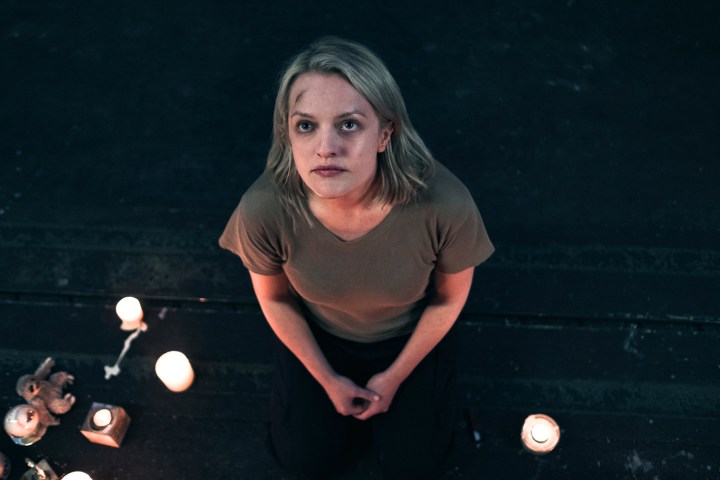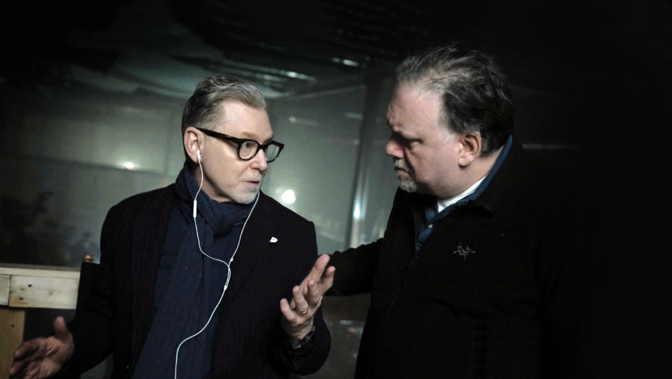
Hulu’s The Handmaid’s Tale isn’t a period piece, but that can be hard to discern. Based largely on Margaret Atwood’s novel of the same name from 1985, the dystopian drama’s first season is mostly devoid of contemporary fashion, cultural references, and most glaringly, modern technology. Any contemporaneity the show has with today’s society is how eerily prescient and accurate its reflections of the darkest parts of today’s America appear.
Note: This article contains some minor spoilers about season 2, so read on at your own risk.
In season 1, The Handmaid’s Tale throws the audience into the middle of a society in upheaval due to a new administration that has stripped away basic human rights. Some viewers saw the first season as an incendiary look at the first year of President Donald Trump’s administration. Early in the second season, the Boston Globe headquarters is reduced to a vacant building after the slaughter of journalists.
Meanwhile, in the real world, the public’s trust in the news has been waning since “fake news” was force-fed into the national lexicon by the Trump administration, leading The Handmaid’s Tale executive producer Warren Littlefield to proclaim to Digital Trends that “in the world we live in right now, the press is under attack.”
- 1. Samira Wiley in Season 1 of the Handmaid’s Tale.
- 2. The Handmaid’s Tale execitove producers, Warren Littlefield (left) with showrunner Bruce Miller.
- 3. Joseph Fiennes (right) with Yvonne Strahovski in Season 2 of the Handmaid’s Tale.
As salient as these parallels are, Littlefield doesn’t want the show’s verisimilitude to be confused with actual reporting of the world we live in. “[The Handmaid’s Tale is] not doing the nightly news. We’re trying to do dramatic storytelling,” Littlefield said.
We spoke with Littlefield, actress Samira Wiley (Moira), and actor Joseph Fiennes (Fred Waterford) ahead of the April 25 premiere of season 2 about the scenes the actors feel are too gruesome to shoot, the prospects of a third season, and how technology (or the lack thereof) can be another tool of oppression.
Oppressive tech
In the first season of The Handmaid’s Tale, ostensibly nothing is off limits. Ritualistic rapes, hangings, and child deaths are almost as indicative of the show as its red handmaid outfits.
“I think it’s all about control. The whole point [of the lack of technology] is to strip these women of every semblance of power that they may have.”
What you rarely see in the show is someone answering a call on a cell phone, checking their laptop, or using much of any technology created since the invention of the printing press. The cast agrees that this lack of technology represents a form of oppression hidden in plain sight.
“I think that is all about control,” Wiley said. “We use our phones for news and gaining information, and anything like that is power. The whole point is to strip these women of every semblance of power that they may have.”
Fiennes further noted that “there are parts of Gilead which sort of outlaw and control technology.” His Fred Waterford character is a commander in the Gilead government, and one of the few people who has used a computer on screen. For Fiennes, Gilead’s restrictions on technology are typical of historically fascist regimes.
“Invariably, those who have the computers, or the phones, are high-ranking officials, and it’s always that hypocrisy that you see in many movements,” he added. “Hitler always said that art from the likes of [Pablo] Picasso and [Henri] Matisse was degenerate, and should be outlawed. Then you would have [Nazi military leader Hermann] Goering, who would go quietly to town, and he would collect the Picassos and the Matisses.”
The Handmaid’s Tale‘s may be the work of fiction, but it has an uncanny ability of connecting so many facets of the the past and present of the real world that the show almost feels too real to be fake.
Dystopian mirror
“[The Handmaid’s Tale is] an alternate reality of the time that we’re actually living now,” Wiley said when asked about the show’s resonance with modern audiences. “I think that’s why people talk about how relevant it is, and how scary it is sometimes, because people are looking for truth somewhere, and I’d like to think they can find some of it with our show.”
“[The Handmaid’s Tale is] an alternate reality of the time that we’re actually living now. I think that’s why people talk about how relevant it is, and how scary it is sometimes, because people are looking for truth somewhere.”
Wiley’s observation has some credence. When the Hulu series debuted in April 2017, the show landed in the middle of a wave of highly publicized sexual assault allegations, before all of the outrage coalesced into the #MeToo and Time’s Up movements. The show became emblematic of the larger movements, with its signature handmaid outfits worn as uniforms by groups protesting an anti-abortion bill in Texas.
Fiennes does “feel the pressure of honoring the show intelligently,” due to the show’s added level of cultural importance. “We know that we’re being kind of like a mirror for a lot of people to what’s going on in certain administrations,” Fiennes said.
Sometimes upholding the show’s high standards is more difficult than just remembering lines.

Too gruesome, too emotional
You know a show may be too realistic with its horrific depictions when the author of those repulsive moments in the source material says parts of the show are disturbing.
In a scene from season 1, one of the handmaids recalls being gang raped to a group of fellow handmaids who, in unison, tell her the sexual assault was her fault. “I found this scene horribly upsetting. It was way too much like way too much history,” The Handmaid’s Tale author Margaret Atwood said in a May 27 interview.
“There’s brutality. There are consequences to our characters’ actions. But, I don’t think we’re ever gratuitous.”
For a show like The Handmaid’s Tale to handle such ominous topics and at the same time provide the visceral storytelling that helps it resonate with so many people, it has to push the envelope.
“Honestly, I don’t think we’re ever gratuitous. There’s brutality. There are consequences to our characters’ actions. But, I don’t think we’re ever gratuitous,” Littlefield contended.
In season 1, the audience is introduced to a ritual wherein the high-ranking official has sex with the handmaid, in order to conceive a child, while the official’s wife holds the handmaid’s arms down. Fiennes expressed his difficulty with filming those scenes before season 1 ended. That difficulty only heightens in season 2 after Offred (Elizabeth Moss) became pregnant at the end of season 1.
“We visit the ceremony again,” he said. “That awful ritual, the ceremony. But given Offred’s physical state, it’s kind of repugnant. I found that too much for me.”
The Handmaid’s Tale can also be as emotionally taxing for its audience as it is for its cast.
“There’s an episode later in the season where we see more of [Moira’s] backstory and exactly where she came from and what her journey is like in Gilead,” revealed Wiley. “I think the world of Gilead just sort of makes any any relationship dangerous. Any person that you want to get close to. It’s dangerous to get close to that person. So, we find out about a person that Moira was very close to and that episode in general was very emotional for me.”
The Next Tale
Littlefield says filming for season 2 wrapped on the morning of April 14 in Toronto. While he says nothing has been announced yet, he does confirm his team is “starting to think about season 3.”
If Littlefield needs any suggestions on what to do next season, he should knock on Fiennes’ dressing room door.
“Through the colonies and certainly in Gilead, we get to see and understand [Gilead’s] reach a little more [in season 2],” Fiennes remarked. “But, I think there should be more to go in season 3, hopefully, about defining the expansiveness of the far reach of Gilead across America.”
We’ll all just have to wait until next year to see how deep down the dystopian rabbit hole The Handmaid’s Tale will go after season 2, and how much of our world will be looking back at us the deeper we descend.









